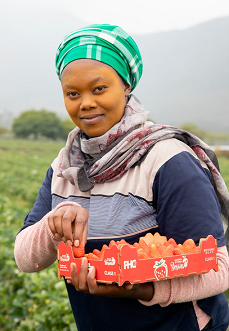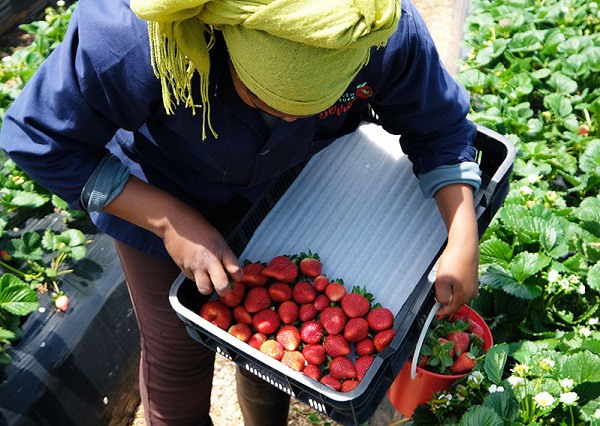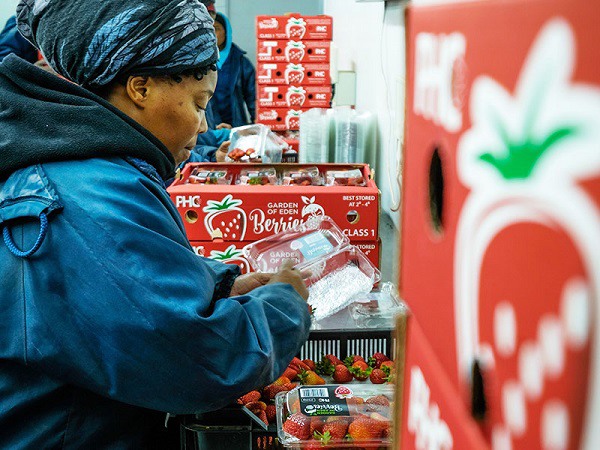 Pioneers of South African strawberry exports under the Garden of Eden Berries brand, Professional Horticultural Consulting (PHC) grows all of their strawberries in open soil on their six farms, ranging from just ten metres above sea level in Brandwag, near Mossel Bay on the South Coast, where strawberries ripen quickly, to farms up in the Outeniqua Mountains with much colder winters.
Pioneers of South African strawberry exports under the Garden of Eden Berries brand, Professional Horticultural Consulting (PHC) grows all of their strawberries in open soil on their six farms, ranging from just ten metres above sea level in Brandwag, near Mossel Bay on the South Coast, where strawberries ripen quickly, to farms up in the Outeniqua Mountains with much colder winters.
In response to market demand, blueberries, blackberries and raspberries are also being established under cover.
"Currently we're only exporting strawberries but we're upsizing our blueberries, raspberries and blackberries so that we can supply all four berry types," says co-owner, Dr Gavin Linsley-Noakes. "We have been testing all the open blueberry varieties available in South Africa for the last six-odd years, and we've simultaneously been working on our own breeding selections. We currently have one selection looking good enough to consider growing for ourselves."
New raspberry and blackberry cultivars tend to do better during winter which gives them something to grow for late summer and early winter, spreading out the berry season.
None of their strawberries are in tunnels, but out in a rainy Southern Cape winter. The main harvest will commence in around four to six weeks' time and will last until February next year. "Strawberries are cool season crops, so they don't like heat. The minute you put plastic over the top you raise the air temperature by at least 2°C and that changes the way they grow, shortening the period from pollination to fruit harvest."
"We get our fruit to Dubai quicker than we get it to Johannesburg."
PHC supplies their South African supermarket programmes throughout the year (although volumes from March to July are very small) while exports commence in June and end in November, when fruit from the Northern Hemisphere growers becomes available.
Current domestic strawberry prices are almost equal to export prices, he says, noting that this sensitive equilibrium is held by exporting at least 40 to 50% of South Africa's strawberries and keeping the local market slightly undersupplied.
"The South African strawberry industry has doubled in size over the last four years and that's been based on export demand. About 90% of exports go to the United Arab Emirates and Saudi Arabia."
They handle their own exports, all airfreight. "We get fruit on the market in Dubai quicker than we can get it in Johannesburg."

Strawberry expansion across Southern Africa
Through its nursery business, PHC supplies many South African strawberry growers with tray plants and a further two million strawberry plants are exported to Southern African countries.
New varieties have aided to the growth of the industry. "We now have infra short day, short day, long day and day neutral varieties, all helping to expand the season quite successfully."
New strawberry growers need deep pockets. "The establishment of strawberries, though relatively easy, is very expensive. Production cost is up to R1.4 million [almost 70,000 euros] per hectare per year."
Farming strawberries is unusually labour-intensive, requiring ten workers per hectare during harvest, seven days a week, for roughly six months.
For fruiting, soil rather than hydroponics
"We're in the business of growing nutrition and the only way you maximise nutrition in strawberries is if you grow them in soil, where through interaction with soil and microbes, plants absorb all the trace elements that are available and they give you balanced nutrition," he believes.
In the nursery, plant material is hydroponically grown to produce plants free of soilborne diseases, and to start with a clean slate. All waste from the nursery and from producing fruit is composted and returned to the soil.
"If you do it properly, you can use the land forever. If plants do pick up soilborne diseases, it only affects production right at the end of the season anyway."

 For more information:
For more information:
Dr Gavin Linsley-Noakes
Professional Horticultural Consulting/Garden of Eden
Tel: +27 62 989 7960
Email: [email protected]
https://phcstrawberries.co.za/










